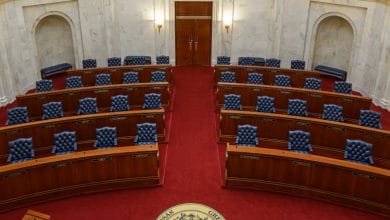Revised ballot language submitted for Arkansas government transparency amendment
by Tess Vrbin, Arkansas Advocate
December 20, 2023
Arkansas Attorney General Tim Griffin will review a revised proposal for a constitutional amendment that would guarantee the right to state government transparency.
On Wednesday, the nonpartisan Arkansas Citizens for Transparency again submitted ballot language for the 2024 initiative. Griffin rejected the popular name and ballot title for the group’s first attempt last week, saying specific terms lacked clarity, including “government transparency.”
The revised version of the Arkansas Government Transparency Amendment defines the term as “the government’s obligation to share information with citizens.”
Under the proposed amendment, the state Legislature “shall not make a law that diminishes public access to government” without the approval of the people of Arkansas. A piece of legislation “diminishes public access to government” according to the amendment if it:
Makes a public process, public meeting, public notice, or public record less open, accessible or available to the people.Modifies the legal standard for recovery of any legal costs in cases regarding government transparencyLimits or restricts the recovery of those costs.
These definitions are broader than the one proposed in the previous amendment that Griffin rejected.
Revised ACT Amendment 12.20.23
The new and previous versions of the proposal would require Arkansas voters to approve any law that would “diminish public access to government” upon referral by a two-thirds majority of the General Assembly.
In emergencies, the amendment would allow the General Assembly to immediately enact a law diminishing public access to government with a 90% vote, but such a measure would still go before the people at the next general election.
The revised proposal replaces the word “transparent” with the phrase “open, accessible, or available to the people” regarding public records and public meetings.
Griffin said in his rejection of the previous version that the term “transparency” had “partisan coloring.” ACT’s seven-member drafting committee disagreed with this.
“We do not consider this Amendment to be partisan, but rather a declaration of the right of all Arkansans to transparency and openness at every level of government,” the group wrote in a Wednesday press release. “Arkansas has had one of the strongest Freedom of Information Acts in the country for 56 years and it is our hope that, with this Amendment, it will continue to serve as a model for government transparency for the nation many more years to come.”
ACT submitted four possible ballot titles, all worded similarly, to Griffin’s office with the proposed amendment.
Griffin has until Jan. 8 to approve or reject the proposal. If he approves it, ACT may begin canvassing the state for signatures.
By July 5, 90,704 registered voters must sign petitions for proposed constitutional amendments to qualify for the ballot. The amendment would take effect on Nov. 6, the day following the general election.
Proposed initiated act
In addition to the amendment, ACT will resubmit a companion initiated act to Griffin’s office after he rejected a previous version Monday. Like the amendment, the act had “partisan coloring” and contained too many unclear terms, Griffin said.
Some of the goals of the proposed Arkansas Government Transparency Act included codifying a definition of a public meeting, which has long been unclear and frustrating to members of government and the news media, and broadening the legal definitions of a “governing body” and “communication” among members of a governing body.
Other provisions of the rejected act included:
Creating stiffer civil penalties for violating the FOIA.Protecting citizens’ right to appeal FOIA decisions to circuit court and collect attorneys’ fees if they win their case.Mandating that records concerning the planning or provision of security services to the governor and other state elected officials be considered public and accessible under the FOIA after three months.
Worries over secrecy grow as state officials shield records from the public
ACT formed in response to Gov. Sarah Huckabee Sanders’ signing of a law enacted during a special session in September that shields the security records in question from public access. Sanders advocated for several more exemptions to the FOIA that met bipartisan pushback and did not advance in the Legislature.
Griffin said the act’s proposed review process for circuit courts to handle challenges from custodians of security records would violate the Arkansas constitutional amendment governing procedural rules of the courts.
The act also sought to create the Arkansas Government Transparency Commission to help citizens enforce their right to obtain public records and observe public meetings. The proposal would have put some appointments to the commission in the hands of the Arkansas Supreme Court, but this violates the separation of powers clause in the state Constitution, Griffin wrote.
Initiated acts require 72,563 signatures to get on the statewide ballot if Griffin approves the proposal.
Arkansas Advocate is part of States Newsroom, a network of news bureaus supported by grants and a coalition of donors as a 501c(3) public charity. Arkansas Advocate maintains editorial independence. Contact Editor Sonny Albarado for questions: info@arkansasadvocate.com. Follow Arkansas Advocate on Facebook and Twitter.






